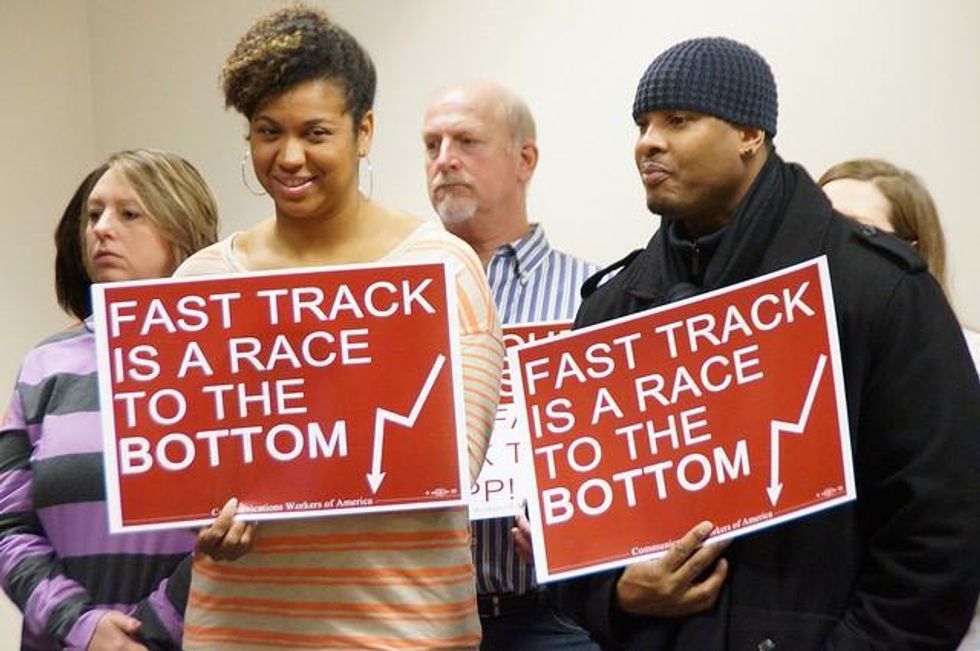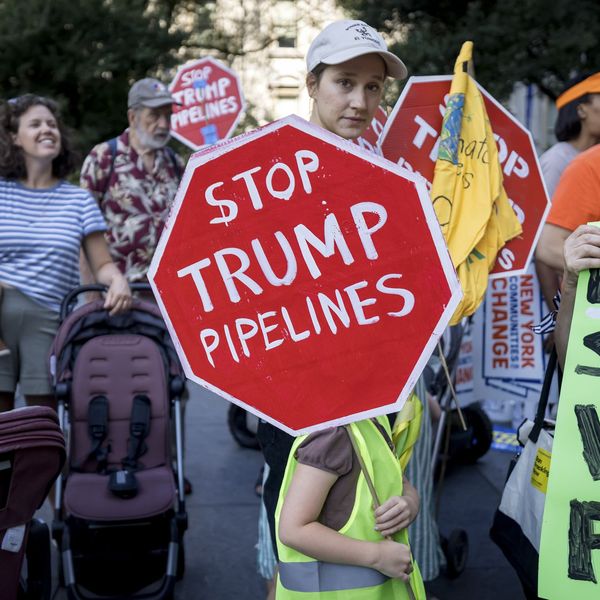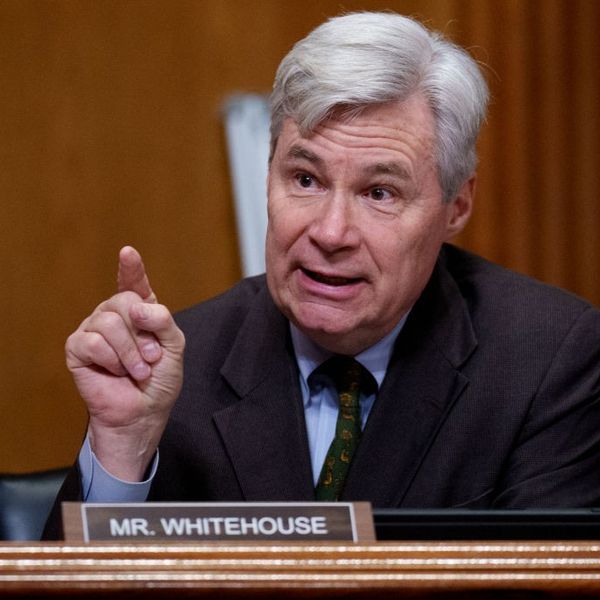Can 'Fast Track' Opposition Bring a 'Knockout Punch' to the TPP?
If trade deal can't be 'railroaded through' with fast track legislation, some wonder if TPP has any success of passing Congress at all.

President Barack Obama has been urging the passage of "trade promotion authority" legislation, also known as "fast track," to "railroad through" the secretly negotiated Trans-Pacific Partnership. PR Watch's Mary Bottari explains:
Fast Track authority...strips Congress of its Constitutional authority to have a meaningful role in U.S. trade policy. If the Fast Track bill passes, the Trans-Pacific Partnership (TPP), a trade deal involving 11 Pacific Rim countries could be completed and signed before it is sent to Congress for a vote. Then the far-reaching trade deal will be railroaded through with no amendments and only 20 hours of debate.
In contrast, "When members of the House and Senate are engaged with the negotiation process, they can bring the concerns of citizens--not just those of corporations with powerful lobbyists and connections--to the fore," writes John Nichols. "That's how representative democracy is supposed to work, and this is especially vital when it comes to debates about economic policy."
As a wide coalition of groups have highlighted, making sure this democratic process remains in place is of utmost importance in the face of the TPP, which "threatens everything you care about: democracy, jobs, the environment and the Internet."
Economist and Center for Economic and Policy Research co-director Dean Baker writes that if fast track is passed, it
would virtually guarantee passage [of the TPP] since members would face intense pressure from corporate contributors and the media, in both the news and opinion sections, to support the deal. Failure to support a deal would mean that a member would be labeled a protectionist Neanderthal (name-calling is standard fare in Washington when pushing for trade deals) in addition to being badly under-funded in their re-election campaign. For opponents of fast track, some recent developments have been encouraging.
But hours after Pres. Obama gave his State of the Union, Senate Majority Leader Harry Reid (D-Nev.) said, "I'm against fast track."
"I think everyone would be well advised just to not push this right now," Reid said.
"If President Obama doesn't get fast tracking powers it's going to be very hard - maybe even impossible for him to get Congress to pass the TPP."
--Thom HartmannWhile Secretary of State John Kerry dismissed Reid's opposition, saying, "I wouldn't let it deter us one iota, not one iota," others see it as a sign of the obstacles Obama faces.
Reporting for The Hill, Alexander Bolton and Vicki Needham write that "Reid's comments show how difficult it will be for Obama to win fast track authority from Congress -- and that his biggest problem will be with fellow Democrats."
Democratic opposition to fast track has been voiced not just on Capitol Hill. Ahead of the SOTU, a letter signed by over 550 labor, environmental, family farm and other Democratic base organizations urged members of Congress not to approve fast track, writing, in part:
After decades of devastating job loss, attacks on environmental and health laws and floods of unsafe imported food under our past trade agreements, America must chart a new course on trade policy. To accomplish this, a new form of trade authority is needed that ensures Congress and the public play a much more meaningful role in determining the contents of U.S. trade agreements... [The fast track legislation being brought forth is] an abrogation of not only Congress' constitutional authority, but of its responsibility to the American people. We oppose this bill, and urge you to do so as well.
If the bipartisan pushback succeeds in stopping fast track so that a democratic, open process must be followed, radio host and author Thom Hartmann says that might just bring death to the TPP:
If President Obama doesn't get fast tracking powers it's going to be very hard - maybe even impossible for him to get Congress to pass the TPP. Democrats and Republicans alike oppose the deal, and without party leadership on board, getting the TPP through Congress will cost a lot of what remaining political capital he has left. Thankfully, Harry Reid who is a former boxer, may have just given the TPP a knockout punch.
"Opposition to the TPP is growing daily, as more people are learning about its disastrous consequences," stated Rep. Alan Grayson (D-Fla.).
"Whether you're a Democrat or a Republican, a liberal or a conservative, it's clear that the TPP is [a] sell-out to foreign corporations that will gut our manufacturing base, and make our trade deficits soar," Grayson said.
___________________
An Urgent Message From Our Co-Founder
Dear Common Dreams reader, The U.S. is on a fast track to authoritarianism like nothing I've ever seen. Meanwhile, corporate news outlets are utterly capitulating to Trump, twisting their coverage to avoid drawing his ire while lining up to stuff cash in his pockets. That's why I believe that Common Dreams is doing the best and most consequential reporting that we've ever done. Our small but mighty team is a progressive reporting powerhouse, covering the news every day that the corporate media never will. Our mission has always been simple: To inform. To inspire. And to ignite change for the common good. Now here's the key piece that I want all our readers to understand: None of this would be possible without your financial support. That's not just some fundraising cliche. It's the absolute and literal truth. We don't accept corporate advertising and never will. We don't have a paywall because we don't think people should be blocked from critical news based on their ability to pay. Everything we do is funded by the donations of readers like you. Will you donate now to help power the nonprofit, independent reporting of Common Dreams? Thank you for being a vital member of our community. Together, we can keep independent journalism alive when it’s needed most. - Craig Brown, Co-founder |

President Barack Obama has been urging the passage of "trade promotion authority" legislation, also known as "fast track," to "railroad through" the secretly negotiated Trans-Pacific Partnership. PR Watch's Mary Bottari explains:
Fast Track authority...strips Congress of its Constitutional authority to have a meaningful role in U.S. trade policy. If the Fast Track bill passes, the Trans-Pacific Partnership (TPP), a trade deal involving 11 Pacific Rim countries could be completed and signed before it is sent to Congress for a vote. Then the far-reaching trade deal will be railroaded through with no amendments and only 20 hours of debate.
In contrast, "When members of the House and Senate are engaged with the negotiation process, they can bring the concerns of citizens--not just those of corporations with powerful lobbyists and connections--to the fore," writes John Nichols. "That's how representative democracy is supposed to work, and this is especially vital when it comes to debates about economic policy."
As a wide coalition of groups have highlighted, making sure this democratic process remains in place is of utmost importance in the face of the TPP, which "threatens everything you care about: democracy, jobs, the environment and the Internet."
Economist and Center for Economic and Policy Research co-director Dean Baker writes that if fast track is passed, it
would virtually guarantee passage [of the TPP] since members would face intense pressure from corporate contributors and the media, in both the news and opinion sections, to support the deal. Failure to support a deal would mean that a member would be labeled a protectionist Neanderthal (name-calling is standard fare in Washington when pushing for trade deals) in addition to being badly under-funded in their re-election campaign. For opponents of fast track, some recent developments have been encouraging.
But hours after Pres. Obama gave his State of the Union, Senate Majority Leader Harry Reid (D-Nev.) said, "I'm against fast track."
"I think everyone would be well advised just to not push this right now," Reid said.
"If President Obama doesn't get fast tracking powers it's going to be very hard - maybe even impossible for him to get Congress to pass the TPP."
--Thom HartmannWhile Secretary of State John Kerry dismissed Reid's opposition, saying, "I wouldn't let it deter us one iota, not one iota," others see it as a sign of the obstacles Obama faces.
Reporting for The Hill, Alexander Bolton and Vicki Needham write that "Reid's comments show how difficult it will be for Obama to win fast track authority from Congress -- and that his biggest problem will be with fellow Democrats."
Democratic opposition to fast track has been voiced not just on Capitol Hill. Ahead of the SOTU, a letter signed by over 550 labor, environmental, family farm and other Democratic base organizations urged members of Congress not to approve fast track, writing, in part:
After decades of devastating job loss, attacks on environmental and health laws and floods of unsafe imported food under our past trade agreements, America must chart a new course on trade policy. To accomplish this, a new form of trade authority is needed that ensures Congress and the public play a much more meaningful role in determining the contents of U.S. trade agreements... [The fast track legislation being brought forth is] an abrogation of not only Congress' constitutional authority, but of its responsibility to the American people. We oppose this bill, and urge you to do so as well.
If the bipartisan pushback succeeds in stopping fast track so that a democratic, open process must be followed, radio host and author Thom Hartmann says that might just bring death to the TPP:
If President Obama doesn't get fast tracking powers it's going to be very hard - maybe even impossible for him to get Congress to pass the TPP. Democrats and Republicans alike oppose the deal, and without party leadership on board, getting the TPP through Congress will cost a lot of what remaining political capital he has left. Thankfully, Harry Reid who is a former boxer, may have just given the TPP a knockout punch.
"Opposition to the TPP is growing daily, as more people are learning about its disastrous consequences," stated Rep. Alan Grayson (D-Fla.).
"Whether you're a Democrat or a Republican, a liberal or a conservative, it's clear that the TPP is [a] sell-out to foreign corporations that will gut our manufacturing base, and make our trade deficits soar," Grayson said.
___________________

President Barack Obama has been urging the passage of "trade promotion authority" legislation, also known as "fast track," to "railroad through" the secretly negotiated Trans-Pacific Partnership. PR Watch's Mary Bottari explains:
Fast Track authority...strips Congress of its Constitutional authority to have a meaningful role in U.S. trade policy. If the Fast Track bill passes, the Trans-Pacific Partnership (TPP), a trade deal involving 11 Pacific Rim countries could be completed and signed before it is sent to Congress for a vote. Then the far-reaching trade deal will be railroaded through with no amendments and only 20 hours of debate.
In contrast, "When members of the House and Senate are engaged with the negotiation process, they can bring the concerns of citizens--not just those of corporations with powerful lobbyists and connections--to the fore," writes John Nichols. "That's how representative democracy is supposed to work, and this is especially vital when it comes to debates about economic policy."
As a wide coalition of groups have highlighted, making sure this democratic process remains in place is of utmost importance in the face of the TPP, which "threatens everything you care about: democracy, jobs, the environment and the Internet."
Economist and Center for Economic and Policy Research co-director Dean Baker writes that if fast track is passed, it
would virtually guarantee passage [of the TPP] since members would face intense pressure from corporate contributors and the media, in both the news and opinion sections, to support the deal. Failure to support a deal would mean that a member would be labeled a protectionist Neanderthal (name-calling is standard fare in Washington when pushing for trade deals) in addition to being badly under-funded in their re-election campaign. For opponents of fast track, some recent developments have been encouraging.
But hours after Pres. Obama gave his State of the Union, Senate Majority Leader Harry Reid (D-Nev.) said, "I'm against fast track."
"I think everyone would be well advised just to not push this right now," Reid said.
"If President Obama doesn't get fast tracking powers it's going to be very hard - maybe even impossible for him to get Congress to pass the TPP."
--Thom HartmannWhile Secretary of State John Kerry dismissed Reid's opposition, saying, "I wouldn't let it deter us one iota, not one iota," others see it as a sign of the obstacles Obama faces.
Reporting for The Hill, Alexander Bolton and Vicki Needham write that "Reid's comments show how difficult it will be for Obama to win fast track authority from Congress -- and that his biggest problem will be with fellow Democrats."
Democratic opposition to fast track has been voiced not just on Capitol Hill. Ahead of the SOTU, a letter signed by over 550 labor, environmental, family farm and other Democratic base organizations urged members of Congress not to approve fast track, writing, in part:
After decades of devastating job loss, attacks on environmental and health laws and floods of unsafe imported food under our past trade agreements, America must chart a new course on trade policy. To accomplish this, a new form of trade authority is needed that ensures Congress and the public play a much more meaningful role in determining the contents of U.S. trade agreements... [The fast track legislation being brought forth is] an abrogation of not only Congress' constitutional authority, but of its responsibility to the American people. We oppose this bill, and urge you to do so as well.
If the bipartisan pushback succeeds in stopping fast track so that a democratic, open process must be followed, radio host and author Thom Hartmann says that might just bring death to the TPP:
If President Obama doesn't get fast tracking powers it's going to be very hard - maybe even impossible for him to get Congress to pass the TPP. Democrats and Republicans alike oppose the deal, and without party leadership on board, getting the TPP through Congress will cost a lot of what remaining political capital he has left. Thankfully, Harry Reid who is a former boxer, may have just given the TPP a knockout punch.
"Opposition to the TPP is growing daily, as more people are learning about its disastrous consequences," stated Rep. Alan Grayson (D-Fla.).
"Whether you're a Democrat or a Republican, a liberal or a conservative, it's clear that the TPP is [a] sell-out to foreign corporations that will gut our manufacturing base, and make our trade deficits soar," Grayson said.
___________________

